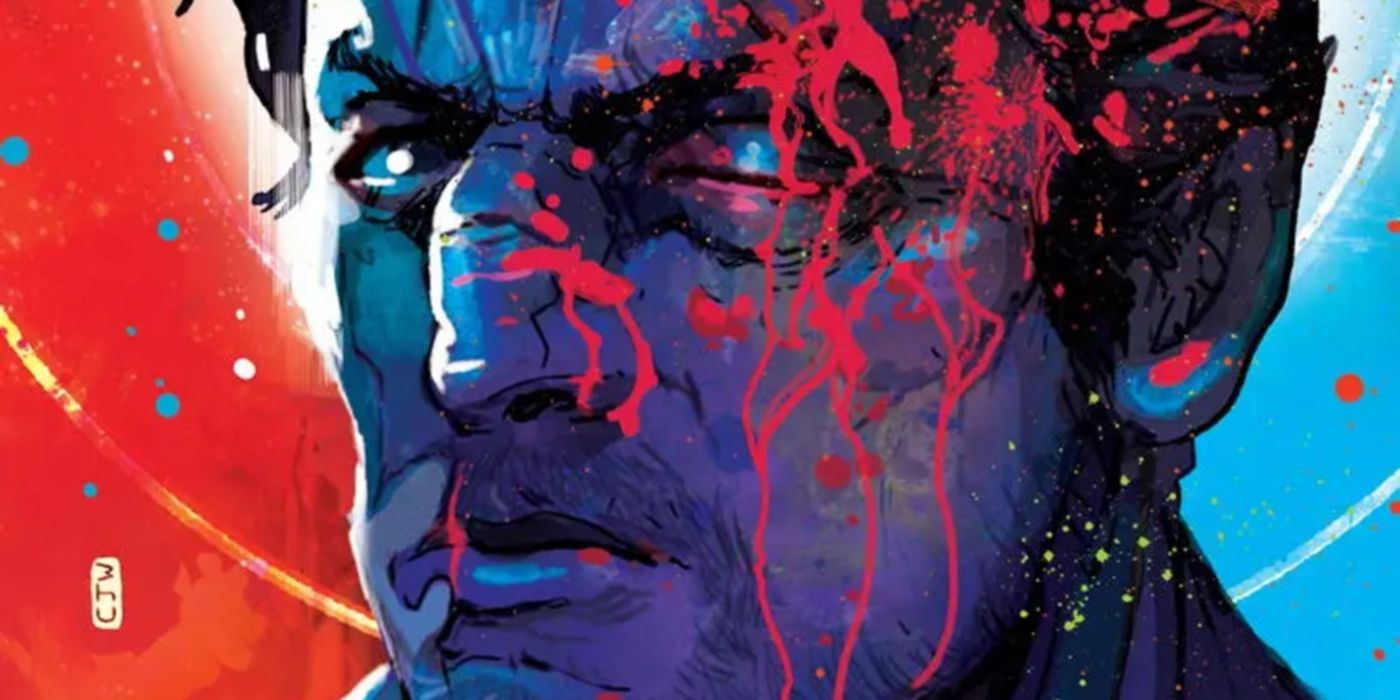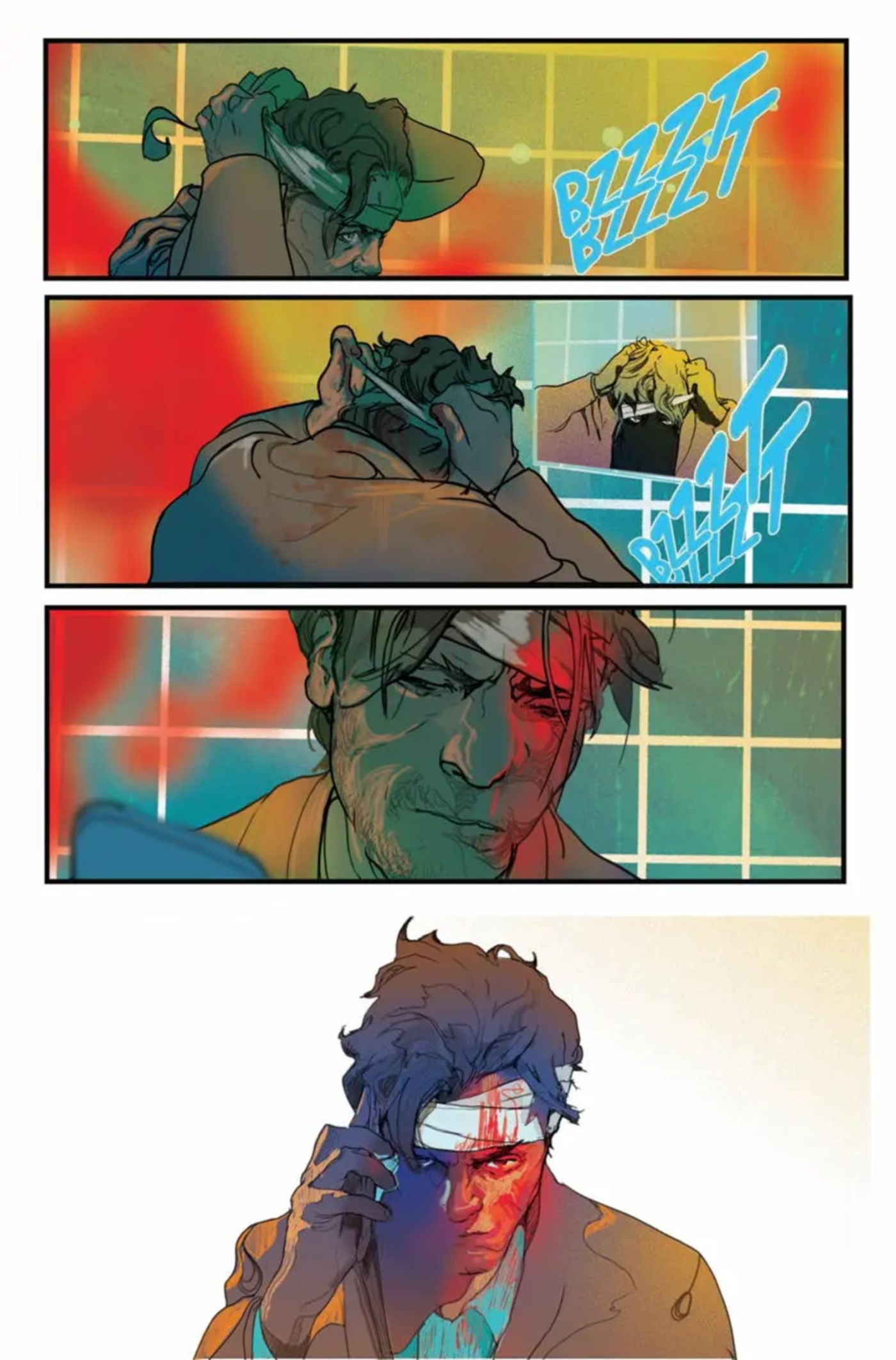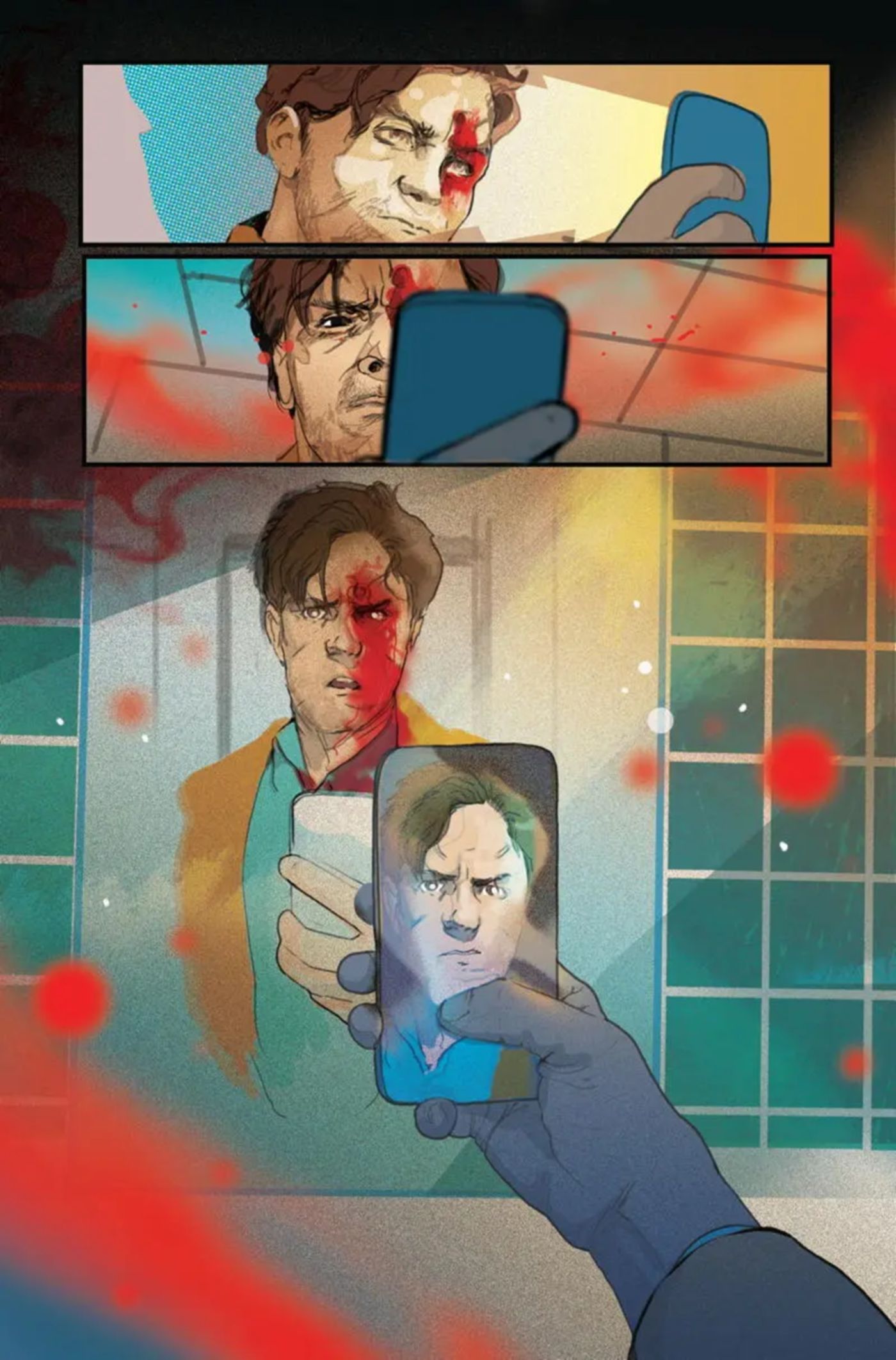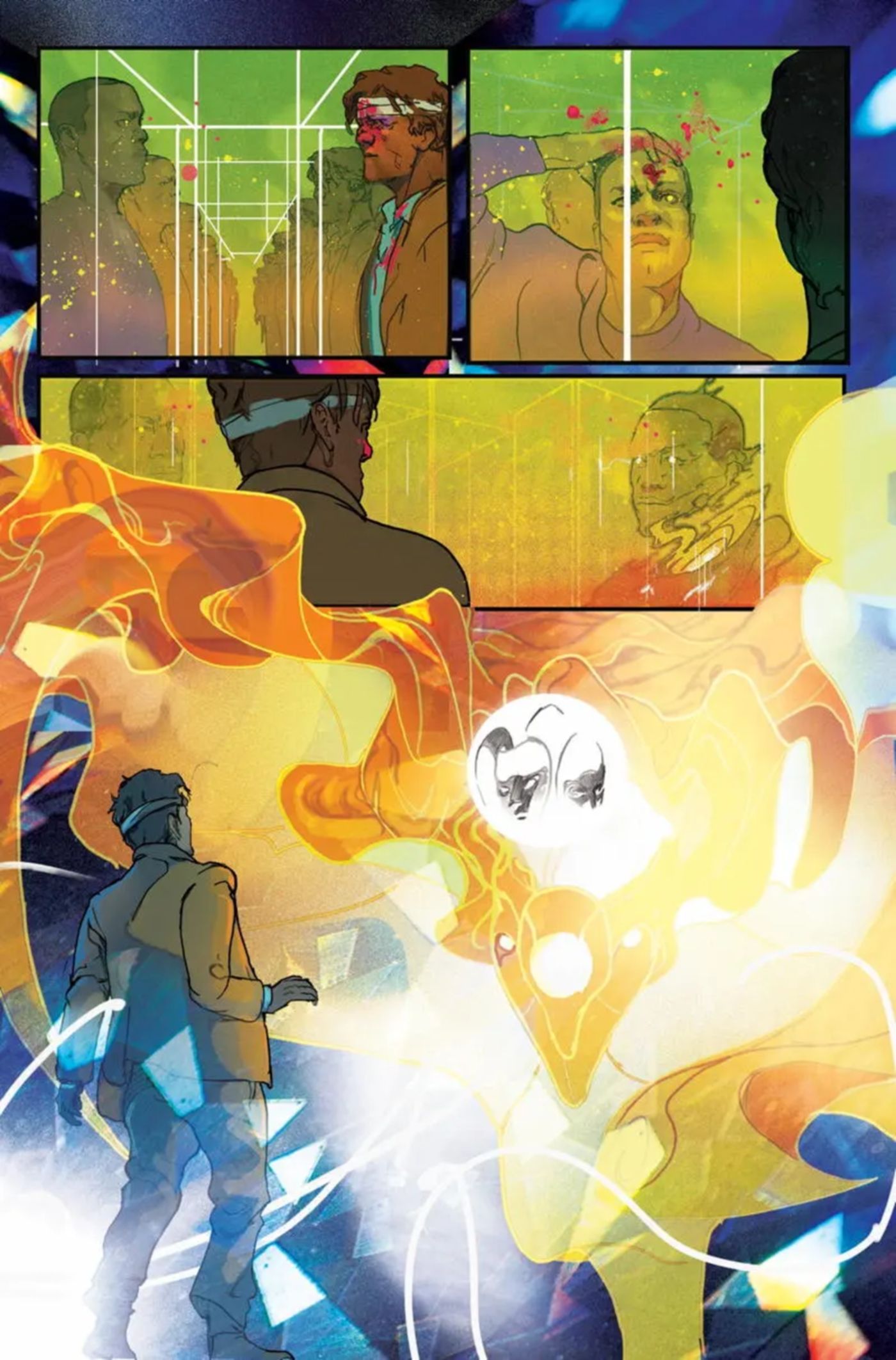Actor Oscar Isaac is teaming up with Bob Johnson, John Alvey, Christian Ward, and Brian Buccellato for a brand-new graphic novel from his wife, Elvira Lind, and his production company Mad Gene Media. Head Wounds: Sparrow is the first comic book project for the Moon Knight actor and his company's first foray into the comic book space.
We spoke to Oscar Isaac, Bob Johnson, and John Alvey about how their childhood friendship led to the creation of the Head Wounds: Sparrow graphic novel, what it was like for the actor to explore different mediums, and their own personal histories with comic books. Check out the full interview below!
Mad Gene Media is a growing publisher with planned and released podcasts, short films, films, and more. What was it like to explore a different medium in comics?
Oscar Isaac: Yeah! My wife, Elvira Lind and I started this company really because we felt like we had such a great collective of friends, people that we know, and for a long time people we grew up with - these deeply creative people - and it just felt like, we wanted to make a platform or at least a space to start to really bring that collective life in and allow a place for that creativity to flourish, and possibly to bring it to bigger audiences.
And so whatever that medium might be, in whichever organic way it comes about - we're also looking at live performance, and theater and all these different things that we're into. When Bob and John brought this to me, we started talking about it and exploring what it could be, and deepening the world. And it was it's a vast world that they created. It seemed like the next step is we wanted it to come to life visually. And that led us to go to Legendary and Robert Napton at Legendary Comics, and they got super excited about the possibility and the story. That's where things just took off.
This was kind of a collaboration a long time in the making, correct? You guys have known each other for a long time. What was it kind of like to tell this story together?
John Alvey: It was fun.
Bob Johnson: It was fun. Yeah. We've always have created together all of us if. I have an idea I email Oscar and call John. And that's not new. So it's everything that I can think of that I think is cool. We go for it. And John and role-play it and Oscar and I talk about it and write songs. Everything has always been that way. I can't remember the time before that, to be honest with you.
Oscar Isaac: We all met in high school!
What drew you to artist Christian Ward's style? It works really well in a neo-noir setting.
Oscar Isaac: You wouldn't think it would. I remember, even when we call Christian for the first time, he was convinced that we'd gotten the wrong person. [laughs] Because like, this is not really what I do. Robert and people at Legendary had given us a list of incredible artists. There's something about Christian's work that was just so interesting to me. It felt so expressive and had so much soul...
Bob Johnson: It was alive.
Oscar Isaac: It reminded me also of a lot of the directors that I love, his paneling the way he would destroy those panels, the way that a story would just kind of pour out of the page when it would become quite realistic versus when it would become quite abstract. Obviously, his use of color. It just felt like he's a storyteller. When you look at his art, it's like it's telling a story. And, that's, I felt like what we needed.
John Alvey: Yeah. It feels like he's always leaving something on the page of himself.
Bob Johnson: He's a great artist, beyond just being a great comic book artists or this kind of artist or whatever. That guy, he has such a soul that comes out through his instruments and it's all alive. It moves on the page it sings to you and it howls at the damn moon and it's beautiful. We love it. It's at a time where thing lines are getting straighter and things are becoming more mechanical technology is great. But to see the human element that he puts into his work is amazing. It's unique.
What was it like to work with writer Brian Buccellato and go through the process and see these ideas that you've created for this world, kind of come to the page and come to life?
John Alvey: It was a huge learning experience. Brian was great. He opened the door for us and showed us how to share this huge project. And at a high level or window level in a focused way, yes. He taught us so much.
Bob Johnson: It taught us not to be up our own ass. We're just learning. We started late. And so we're just learning this medium for the first time. And John and I are using these big words since we're D&D geeks, and we're using jargon. And Brian says, you know, "lighten the fuck up. Use regular words, here, you're trying to get people to enjoy this, you're not trying to prove you're smarter than anybody else." And you know, when you first start anything, your butts clenched, and you're trying to hit all the right notes, and you don't want to mess anything up. The guy really helped us to, to loosen up and just create with the group,
Did anything in particular surprise you about the medium as opposed to other kinds of work you've done before?
John Alvey: We were trying to learn to write for the screens right When Bob came up with the story, and that's what we're studying. And then to see the difference between what we were doing and a graphic novel script. It was a big difference. It was eye-opening.
Bob Johnson: These people are artists, man; everybody who is part of the process is important. We all have to be pointed in the same direction. And it's great. Once everybody's harmonizing with one another, it's a hell of a time.
Oscar, you've played comic book characters before, so what was it like to kind of flip that whole script around and be on the other side of it as opposed actually embodying a character?
Oscar Isaac: Yeah. I mean, look, the truth is, for me, this was an opportunity to get Bob's voice out there, you know, he is a wise folk philosopher king, and to have this opportunity to share that with the world through the voices of a lot of artists like John and Christian and Brian. But at the core, at the creamy, cooler spiritual center is this point of view. I think that for me was what was most exciting, and the fact that it was in the shell of this comic, was just, it was a different medium, you know, to be able to do that.
Are there any long-term intentions to adapt Head Wounds: Sparrow to different types of mediums as well through Mad Gene?
Bob Johnson: I think all of us are not looking to where things are going, but what we're doing. If we have the opportunity, the world is huge and everything is there, that needs to be there. We've thought of so many scenarios we've come up with so much going forward, but we're more focused on creating, creating, creating. People decide if they want to buy it or if they want to second helping. And then you go from there. Yeah, it doesn't just magically become a movie. Those things are up to the public and up to the reader in the comic book reading world. Here's what we have, and I hope you guys love it and enable us to do more.
Oscar Isaac: But it is the beginning of a much bigger story. So, you know, there's a lot of story to tell - it's the tip of the spear.
What was your guys' own experience with comics?
Oscar Isaac: I was a big fan of Spawn fan and the X-Men. I was an X-Men collector.
Bob Johnson: I like um... *thinking*
Oscar Isaac: "howls"
Bob Johnson: Lobo! I have all the Lobo comic books. He killed Santa Claus and the Easter Bunny in one book. And it was because they were corporate sons of bitches. How do you not love this guy? And so I love Lobo and many others, like Spawn. I absolutely love anything X-Men. '90s Batman. I loved the art. The sparse on the page. Hardcore, yet straightforward. Like the background was gone. And all you saw was the foreground. Everything else was just outlines. I love that shit. Anything that punches you in the mouth and says READ ME. That's what I like.
John Alvey: Yeah, Captain America. And for me, the '90s was Daredevil and Captain America. That's what I collected mostly. There was a really great run in the '90s where it was Captain America on ice, where he accidentally smoked some crack and decided he was going to beat up his friend. He went to Kingpin's house and sat down and ate spaghetti and meatballs.
When I first started collecting, Daredevil... Mephisto and metaphysical stuff, where Daredevil entered Hell or traveled to another world and have to fight off all these demons, and then bring it back down to street level in Hell's Kitchen. I love that shit.
What do you hope readers take away from Head Wounds: Sparrow?
Bob Johnson: It's up to them. I'm not I'm not going to force anything down anybody's throat. And any story you read, we can read a sci-fi or fantasy novel and we'll butt heads forever deciding which character we would be. Everybody has a different point of view! So you come at it and connect to it. And I want them to like it.
John Alvey: There's even more to that with a graphic novel. Because you're reading. It's personal. You know what I mean? There are so many things that aren't told...
Oscar Isaac: ... You're kind of filling in the story ability and the story.
John Alvey: ... Yeah! So it should be personal for everyone.
Thanks so much to Oscar Isaac, Bob Johnson and John Alvey for taking the time to talk to us about their new project from Mad Gene Media. Head Wounds: Sparrow by Isaac, Johnson, Alvey, Brian Buccellato, and Christian Ward from Legendary Comics is available in comic book stores and online retailers now!
Next:




